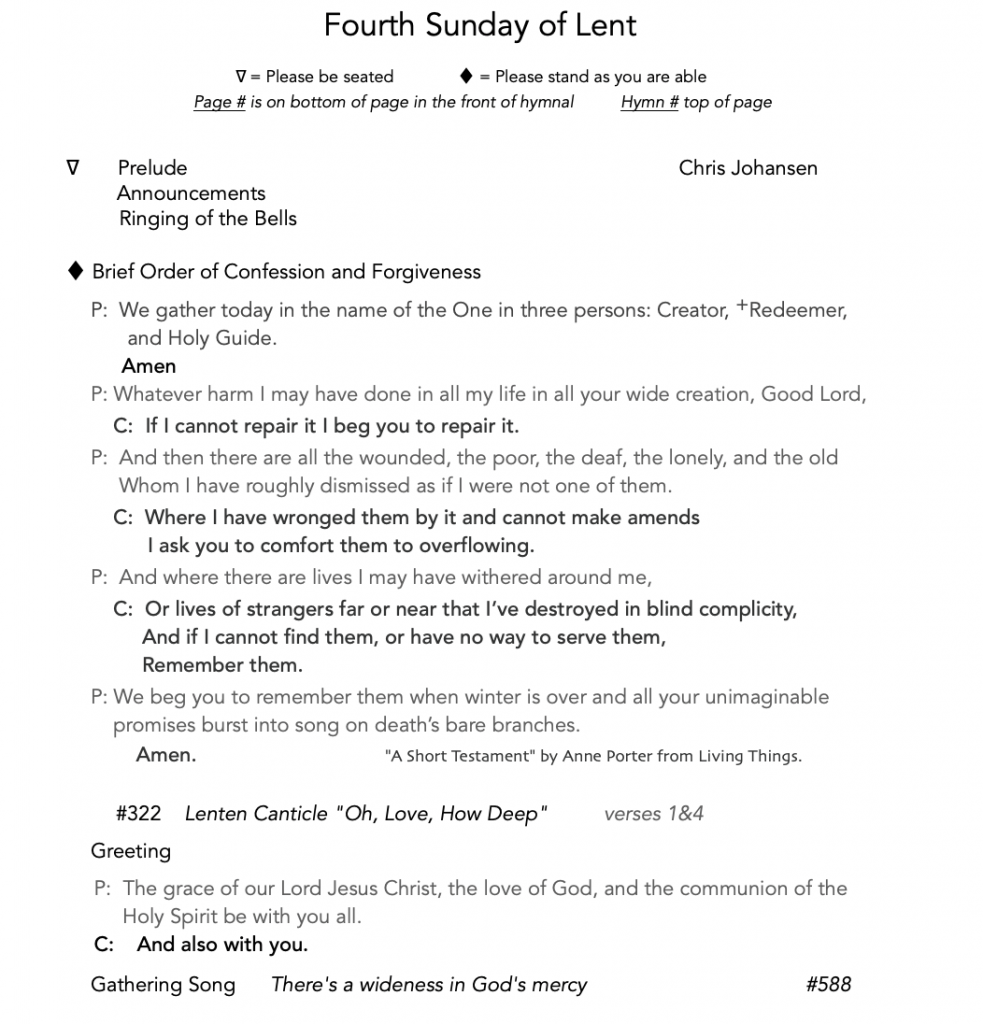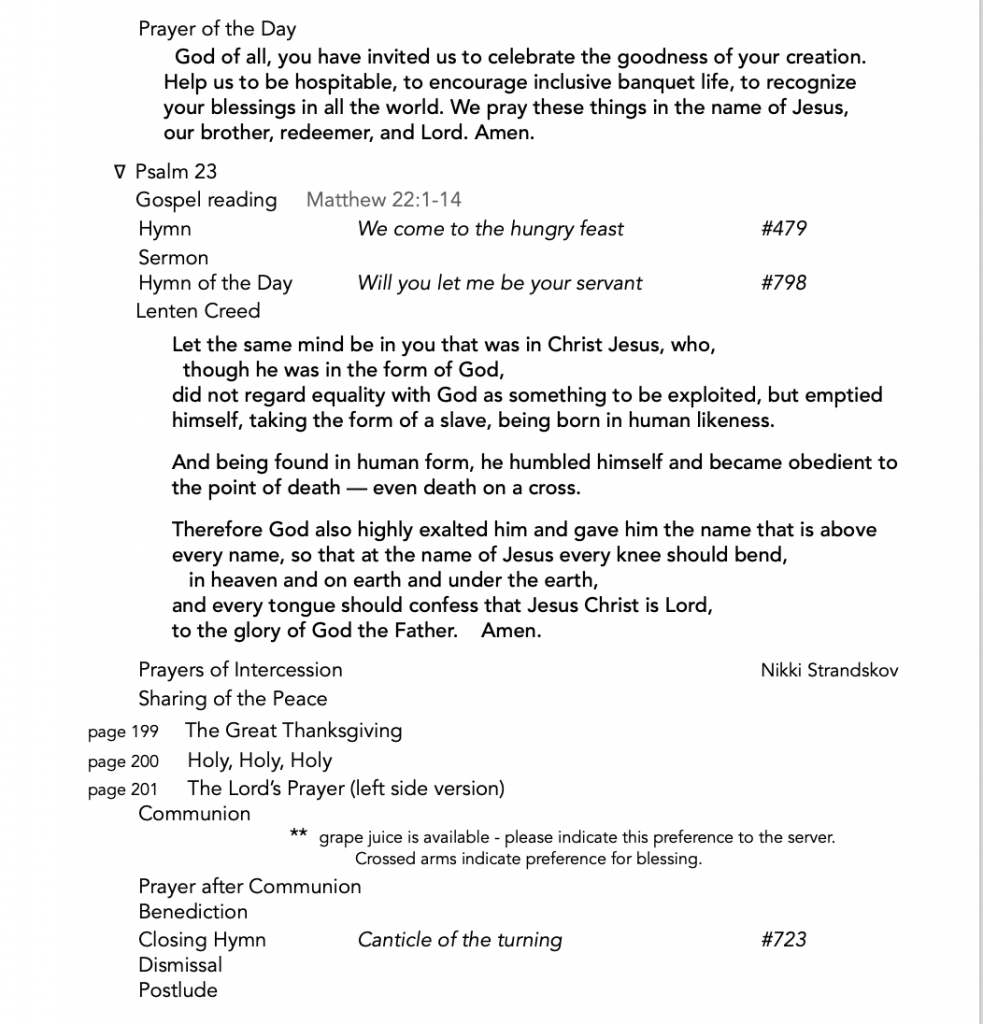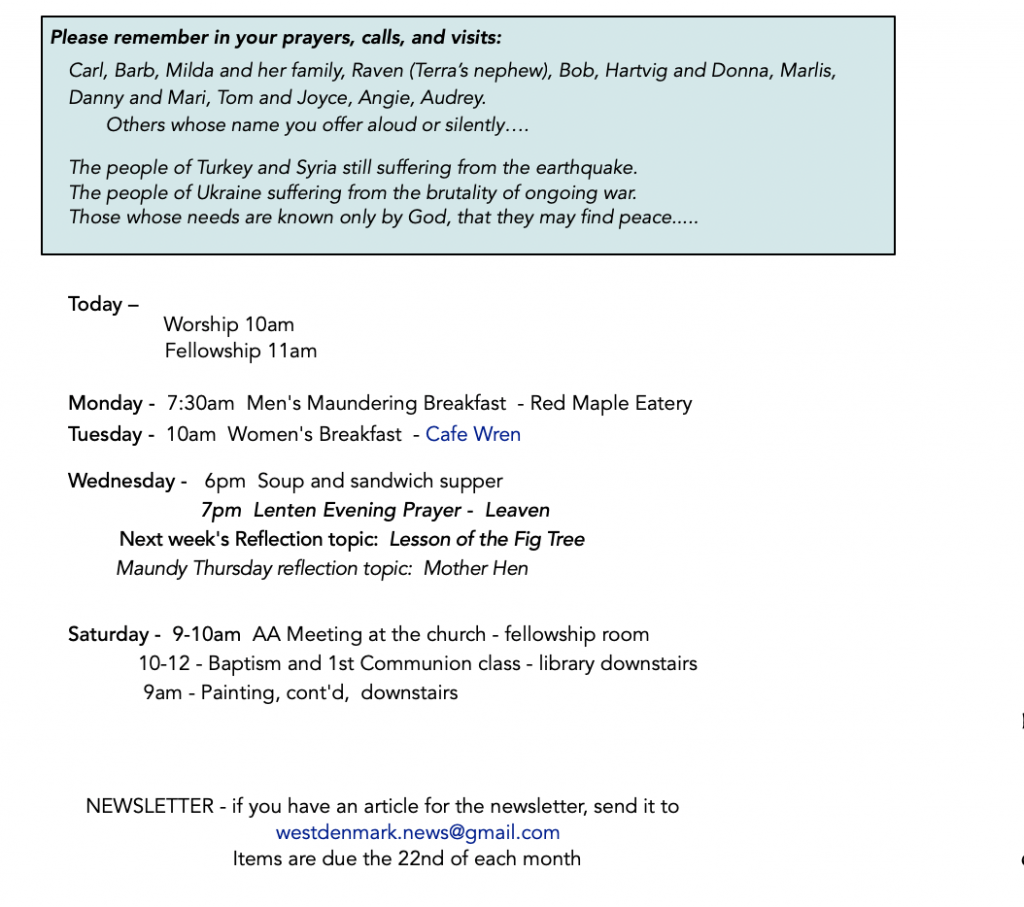Audio Recording


Matthew 22:1-14
Once more Jesus spoke to them in parables, saying: 2“The kingdom of heaven may be compared to a king who gave a wedding banquet for his son. 3He sent his slaves to call those who had been invited to the wedding banquet, but they would not come.
4Again he sent other slaves, saying, ‘Tell those who have been invited: Look, I have prepared my dinner, my oxen and my fat calves have been slaughtered, and everything is ready; come to the wedding banquet.’ 5But they made light of it and went away, one to his farm, another to his business, 6while the rest seized his slaves, mistreated them, and killed them.
7The king was enraged. He sent his troops, destroyed those murderers, and burned their city. 8Then he said to his slaves, ‘The wedding is ready, but those invited were not worthy. 9Go therefore into the main streets, and invite everyone you find to the wedding banquet.’
10Those slaves went out into the streets and gathered all whom they found, both good and bad; so the wedding hall was filled with guests.
11“But when the king came in to see the guests, he noticed a man there who was not wearing a wedding robe, 12and he said to him, ‘Friend, how did you get in here without a wedding robe?’ And he was speechless. 13Then the king said to the attendants, ‘Bind him hand and foot, and throw him into the outer darkness, where there will be weeping and gnashing of teeth.’
14For many are called, but few are chosen.”
First, the good news. God wants the tables to be filled. There’s going to be a banquet, by God, and resistance is futile.
The gospel of our Lord.
It is true, and it is the good news of the kingdom coming. But we’re not there yet.
Too often this parable has been taught or understood as Christians are In, the Jews are Out. That is wrong. This is not a supersessionist, anti-Semitic text. Jesus told it against Jewish leadership, not against the Jewish people. He told it against human nature and the representatives of the status quo – those elite power brokers of every culture and place. It’s being told against classism, racism, against passive-ism and hegemony. Because we’re all invited to the Banquet. That’s the point of the parable. We all always have been invited into the presence of the King of Glory. We all have always been urged, enticed, invited to the feast of good food, flowing oil, healthy waters, regenerative life in the way and will of God.
We just don’t want to go.
We don’t want to do it that way – in that all-inclusive, everybody’s welcome, pull-up-a-chair way of the kingdom. Because…. well, because, how much are you really willing to give up to ensure that others have the same choices and chances? I think that is the key question.
It is the original and perennial hot button. It can be asked functionally, or economically, or spiritually. How much are we willing to let go of our ways, our will, our leverage, the specific shape of our beliefs so that the invitation seems actually inviting to those who aren’t already like us? And if anyone is admitted, then what becomes of the rules or codes of behavior and standards of belief that we think are necessary and that have gotten us thus far along the way? This is not a trivial faith question.
How inclusive is the kingdom of God?
In Matthew’s community, the question was framed around how to include Gentile converts into the young Jewish Christian community. What standards of Jewish righteousness still appliedy – circumcision, for example? or purity codes about what foods could be eaten? What needed to be maintained, upheld, hung onto? After the destruction of Jerusalem and the temple, as Jewish religious culture lost that anchor and became more dissipated through the diaspora and through Paul’s mission to the gentiles (like salt spread so thin it’s in danger of losing its saltiness), what becomes of the rules that kept you together, that identified you as the people of God? How far can toleration stretch before righteousness breaks and God takes offense? Can you eat a kabob at Jericho Days if the meat was dedicated to Zeus? Jesus welcomed those whom the Law cast out, he ate with known sinners. And, if God raised him in spite of, or because of his rule breaking, then what were they to do about the prohibitions and Torah?
We believe that Jesus was the embodiment of God’s word, that he was the heart of the law that had gotten sidetracked by the rules. But we still trip over the topic. What are the necessary parameters of Christian life? What beliefs or doctrines need to be set in stone? How inclusive is God’s desire and intention? There are a lot of Christians don’t think it even extends to all Christians. So what about Jews and Muslims who profess belief in the same spiritual ancestors and, presumably, the same One God? What about Buddhists or Indigenous religions? Are those people invited to the Banquet? What about those who don’t believe in any of it? Is being kind or generous or helpful – being a good person – enough?
How much of this big question can we ask a parable to explain?
The third round of invitations went out and the slaves came back with everybody they found, both bad and good, weeds and wheat, sheep and goats, and everyone found a place to sit at the table. God will reconcile the ends of the spectrum somehow (the first and the last) – we don’t need to concern ourselves with that; but, just when we’re getting settled in our chair and looking around to see who else is there, there is a scuffle and some guy is hauled up out of his seat and grilled. We might concern ourselves with him. Because we don’t really know why. We don’t have enough information. We don’t know his motivation or excuse. The tradition says he didn’t put on the robe of righteousness – and that would be a very Matthew kind of thing to say – righteousness was a big deal for Matthew. “How did you get in here without a wedding robe, Friend?” You’d think the hall monitors might have been brought to book for letting him in without the proper garment.
It’s hard to suss out how it is this guy’s fault given the scanty information we have – except, that maybe, maybe Matthew is warning that all of us are this guy, all are subject to judgment, anyone might be held accountable. Perhaps, the reality of inclusion should actually show, should be evident. Some Cinderella-like transformation needs to happen as we enter the Ball.
In an article for Working Preacher, Karoline Lewis wrote: “It is not enough … to call yourself a follower of Christ and then act as if you were sound asleep during the Sermon on the Mount. It is not enough to pledge allegiance through church membership without then vowing to live out that chosen-ness in the world. It is not enough say you are a “Christian” and then stay silent when life, liberty, and love are in jeopardy.
“Many are called, but few are chosen, indeed. The chosen are the ones who realize that just showing up is not enough… The chosen are the ones who insist that mere acquiescence, week after week, day after day, to doctrine and dogma will not stand the test of what it means to be the salt of the earth and the light of the world. The chosen are the ones who believe that a God who is Immanuel might very well stake a claim on our whole humanity.
“And, the chosen are the ones who understand that the time for bringing about the Kingdom of Heaven is now — not later, not tomorrow, not someday, but now.
“What not to wear? Complacency, conformity, and any kind of garb that is content with the way things are. What should we wear, so that the whole of the world can see who we are and what we are about? The kind of compassion, birthed by God’s own righteousness, that cannot leave things the way they are.”
We watched the movie, ‘Harriet’, the other night at home, and I haven’t quite gotten over it. It’s a deeply powerful movie about Harriet Tubman and her determination to set slaves free.
She was one of those chosen. Braver and more in-tune with the voice of God than I can imagine ever being. There are others, like her, that we could pick out of history, people who allowed the presence of God to reside within them, causing them to act with no thought to their own mortality: as long as they have breath, they will do what is within them to further the cause of freedom, truth, wholeness, goodness. Maybe you can name people you know or have heard about who exemplify that passion and chosen-ness. That is the Christian model and ideal. That is the life of Christ.
What I have realized in thinking about all of this is that I’m not one of them. I’m not one of the chosen and that I don’t want to be. I feel bad saying that. I suppose there might be a scenario in which I – any one of us – would throw everything we’ve got, every fiber of our will and soul into battle for a greater good. But I can’t imagine it, and don’t want to find myself there, chosen for that. I am among the called, the gathered, the safe in the crowd.
I’m too lazy, too passive, too comfortable, too conciliatory. I’ve spent my life rejecting black and white mindsets and world views of clear-cut answers and one-way theologies. I’m not going to draw a line in the sand and stand firm. I’m too prone to self-doubt for that. I’m a follower of the broad way of Christ. It takes a certain kind of person to be an authentic, rigorous, narrow path Christian. I think Matthew was right. Few are chosen for that purity and faith and trust in God’s word.
Matthew would probably be astounded to know the small, disparate communities of Jewish Christians of his era would become the Christian church of today – a world wide, incredibly varied, terminally fractured body following, in various degrees of rigor, in the way of Christ. And I doubt that Jesus would recognize himself or his teachings in the practice of the modern American Christians. Sometimes that bothers me. We should probably all strive to be the chosen; to be brave enough, trusting enough to listen for that voice of God and act on it. For how else will the world turn. But, maybe, we don’t want to.
God’s will is generally off-putting, shall we say, to those in comfortable circumstances. We don’t want to be asked to make radical changes to our life-styles or beliefs. We actually kind of like standards and rules of inclusion as long as we feel reasonably confident that we are included. We support the systems that keep us in place, that uphold the empire that maintains us. We might not like the sound of that, but we can’t deny the truth of it.
Otherwise, we would have changed by now. Otherwise, the world would have turned by now — the last would be brought up to the head of the line and the first would step back, the poor would be raised and the powerful brought down from their egos.
These parables are meant to be problems for us. We are supposed to be challenged by them, to sit with them, wondering about them, letting them work on us. I hope you will allow that.
Even if the Christian church of today is a collection of mostly okay people who try not to cause harm, who try honestly to be good people, who mix in with our fellow citizens as bits of light, maybe that’s what we’re for. I mean it could be worse. The Holy Sprit still seems to call, enlightens and woo us, shaking us out like grains of salt, planting us like tiny mustard seeds, growing us as fractals of leaven.
We can’t know if the world is better for it. I suspect that the Spirit will do her work of gathering in the bad and the good, occasionally choosing one or two to be remarkable, light to counter the darkness, while letting the rest be good enough, salt and ashes to season, to melt ice, to etch imprints of God in the world.
Did Jesus die for that? Does that kind of life – our kinds of lives – do justice to his life, to God’s hopeful, outrageous experiment? No, probably not.
I’d like to help make the world turn, I’d like to see a shift in power, I’d like to know our small, mild-mannered acts of kindness and care play some part in God’s will.
But… even if we are tepid Christians, too comfortable to stick our necks out, too quietistic and complicit to demand and bring about change to systemic wrongs… we can still be true to our understanding of the gospel’s word of love and inclusion and uphold that in our dealings with others, and await our invitation to the Feast where some are chosen, but even the small ones are welcome.
Your invitation is in the mail.
